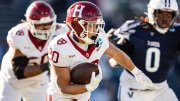A wipeout on the slippery Astroturf of the University of Pennsylvania's Franklin Field dished the football team's hopes of gaining a second consecutive Ivy League championship. Winless in Philadelphia since 1980, Harvard took a 44-9 licking from a formidable Penn squad that effectively grounded the record-setting aerial act of Crimson quarterback Neil Rose '02 ('03) and wide receiver Carl Morris '03. With a convincing win at Cornell the next weekend, the Quakers sewed up the Ivy title for the third time in five years. That same weekend brought Harvard the best possible consolation prize: a windswept 20-13 victory over Yale.

Played under wintry conditions before a near-capacity Stadium crowd of 30,323, the 119th iteration of The Game gave Harvard an Ivy record of 6-1 and second place in the final standings. Holding Yale's league-leading rushing attack to 86 yards, the Crimson defense had a red-letter day. So did sophomore backup quarterback Ryan Fitzpatrick, who came on late in the first half to jump-start the offense. His running and passing generated a three-touchdown rally in the third period, effacing a 6-0 Yale lead and putting Harvard ahead to stay. Touchdowns two and three were set up by long passes to Morris, an all-America candidate and the most accomplished receiver in Harvard football annals. A four-year letterman, Morris can list eight school records on his résumé when he interviews for a position in professional football. In his valedictory season, he ranked second in the nation in receptions (9.0) and receiving yardage (128.8) per game.
Beating Yale helped salve the pain inflicted at Penn a week earlier. But while that rain-soaked washout had to be humblingHarvard hadn't lost so lopsidedly since 1995 (Brown 47, Harvard 8), and its offense hadn't been held to single digits since the 1998 Yale gamethe outcome, in hindsight, wasn't unthinkable. Penn's high-scoring offense had registered more than 40 points in four of the team's five Ivy victories; statistically, the Quaker defense was the nation's best. With home-field advantage and a 13-game Franklin Field winning streak, Penn was primed to avenge the 28-21 loss to Harvard that decided the Ivy title in 2001. Coming off the first undefeated-untied Harvard season in 88 years, this year's Crimson team was 5-0 in Ivy League play. But almost all of its games had gone down to the wire, and the team had let victory slip away in the final minute of two nonleague contests.
As he'd done the previous season, with good results, head coach Tim Murphy had preached ball security at his squad's practice sessions. Until the Penn game, Harvard had yielded the fewest turnovers (less than one per game) of any NCAA 1-A/1-AA team. But ironically, turnovers were the Crimson's undoing in both nonleague defeats. At Lehigh, in the season's third game, Harvard held a 35-21 lead in the fourth quarter, lost the ball on an errant lateral, and gave up two late scores that allowed the scrappy Mountain Hawks to salvage a 36-35 win. At the Stadium two weeks later, with Atlantic 10 power Northeastern leading 17-14 and two minutes left to play, Harvard stormed downfield on an 80-yard drive, only to fetch up eight yards short of the goal-line when another lateral went awry. Hard lines, but worse happened at Franklin Field, where Penn's wrecking crew capitalized on a pair of early fumbles to begin the deconstruction of Harvard's title aspirations. More about that in a moment.
The Penn game aside, this year's team played exciting and sometimes spectacular football. Rose and Morris tore up opposing defenses, along with much of the Harvard record book. When a spinal disc injury sidelined Rose, Fitzpatrick filled in brilliantly. Rodney Byrnes, another sophomore, emerged as a breakout pass receiver, kick-return specialist, and sometime running back. The offensive line, led by all-Ivy tackles Jack Fadule '03 and Jamil Soriano '03, fronted the Ivy League's best all-around attack. On the other side of the ball, all-Ivy captain-elect Dante Balestracci '04; his linebacking sidekick John Perry '03; end Michael Armstrong '03; and cornerback Chris Raftery '04 were defensive standouts.
Rose, a first-team all-Ivy and all-New England selection a year ago, was elected captainthe first quarterback to be so honored since Carroll Lowenstein '52at the end of last year's bravura season. Having sat out his sophomore year with a broken foot, he qualified for a medical waiver and returned this fall as a fifth-year senior. Though his back injury caused him to miss two full games and parts of two others, Rose continued to set records, completing his third and final season as a starter with Harvard career records for pass completions, pass attempts, passing yardage, total-offense yardage, pass-completion percentage, and touchdown passes.
Rose started the season in fine form, hitting on 19 of 22 passesthree of them for touchdownsin the opener against Holy Cross. His completion percentage of .864 tied a Harvard single-game record set by Vin Ferrara '95. When Rose took a jarring hit to the head in the second half, Fitzpatrick stepped in and ran off a late, clock-killing ground drive that preserved a 28-21 victory. The versatile Morris was also in form, snaring 11 passes, scoring twice, and running the ball for a vital first down that kept the late drive alive.
In the team's first Ivy League game, a 26-24 win at Brown, Rose had clicked on five of five early pass attempts when a Bruin tackler upended him and his right leg "seemed to freeze." Relieving him, Fitzpatrick directed three consecutive scoring drives that obliterated an 18-7 Brown lead. The hard-running sophomore, a former Arizona high school all-star, passed for two touchdowns and became the first Harvard quarterback in a decade to have a 100-yard-rushing day, racking up 137 yards on 22 carries. Despite limited playing time, Fitzpatrick would end the season as the team's leading rusher.
While Rose's back mended, Fitzpatrick started the next two games. Against Lehigh he connected on 22 of 36 passes and rushed for 59 yards; the following weekend, against Cornell, he hit on 24 of 32 passes for 353 yards and three touchdowns, rushing for 66 yards and another touchdown. Morris had another 11-catch day, streaking down the Stadium sideline to score on a 54-yard pass from Fitzpatrick. Rodney Byrnes chipped in with an 89-yard kickoff return for a touchdown, and later scored on a short run. For his central role in Harvard's 52-23 rout of the Big Red, Fitzpatrick was named Ivy League Offensive Player of the Week.

Returning to action, Rose started the Northeastern game, but had only 6 completions in 19 pass attempts and gave way to Fitzpatrick in the second quarter. Harvard's normally sure-handed receivers were not at their best in the 17-14 loss, dropping nine or 10 catchable passes.
Fitzpatrick started at Princeton a week later, but this time it was Rose who came off the bench to get the team moving. Checking in with the score tied, 7-7, in the second period, he made good on 13 of 19 passes and engineered scoring drives on three of his first four possessions. The Crimson defense forced five turnovers, and tailback Nick Palazzo '03, rebounding from a shoulder injury, ran for three touchdowns. Harvard's 24-17 win, its seventh straight victory over Princeton, bumped the Tigers out of a tie for first place in the Ivy standings.
Rose and Morris put on a stunning show at Dartmouth the next weekend. Rose threw 50 passes; his 36 completions, 443 passing yards, and 449 yards of total offense broke records he'd set as a junior. Morris caught an astonishing 21 passeseight more than the previous Harvard recordbefore leaving the field with a concussion in the fourth quarter. Two of his catches went for touchdowns, and his 257-yard day set another Harvard record. Holding off a late Dartmouth surge, the Crimson left town with a 31-26 victory.
A 28-7 defeat of a struggling Columbia team that had lost its last six games gave Harvard its twelfth consecutive Ivy win. After yielding an early touchdown, the Crimson defense kept the Lions off the scoreboard for the remaining 54 minutes of play. Rose connected on 25 of 35 passes, and an unheralded tailback, Ryan Tyler '06, provided a surprise bonus. Standing in for the reinjured Palazzo, Tyler scored the team's first touchdown and gained 120 yards in 19 carries, becoming Harvard's first freshman back to attain a 100-yard rushing game.
Then came the Penn debacle, a Philadelphia version of Grand Guignol played out in a cold rain before 18,630 spectators. Harvard got in wrong on its first possession, when a hard hit parted Rose from the ball and Penn cashed in with a field goal. On the Quakers' next series, Harvard defensive end Brian Garcia '04 sacked Penn quarterback Mike Mitchell in his own end zone for a safety: Penn 3, Harvard 2. Close game? No such luck. Less than two minutes later, Penn defenders mobbed Rose as he tried to pass, the loose ball bounced into the hands of defensive end Chris Pennington, and Pennington ran 51 yards for a touchdown. The Quakers hadn't yet made a first down, but after less than five minutes of play they'd put 10 points on the scoreboard. The Penn offense now took charge, as the strong-armed Mitchell unloaded three scoring passes within a six-minute span in the second period. Up 34-2 at halftime, Penn padded its comfortable lead with one more aerial touchdown and a field goal. Fitzpatrick, replacing Rose in the third quarter, made the score slightly less ignominious by throwing a late touchdown pass, his eighth of the season, to tight end Matt Fratto '04.
Penn's commanding performance left no doubt about its right to the Ivy title. The Quaker offense played almost error-free football. Shifting defensive alignments tested Rose's usual skill at making line-of-scrimmage adjustments, and double coverage held Morris to three harmless catches for 16 yards.
Unhappily for Harvard, the trouncing came in the wake of an unprecedented wave of hype. For the first time, ESPN chose to air its College GameDay pregame show from a Division 1-AA venue, broadcasting from a canopied stage set up in the horseshoe curve of Franklin Field. The two-hour show earned the highest rating in the program's 16-year history: it was seen in an estimated 1.524 million TV households, topping the record 1.494 million that tuned in two years earlier, before the Florida-Florida State game.
Had Penn lost its last gamea virtual impossibilitya victory over Yale would have yielded Harvard a share of the Ivy title. In actuality, The Game was a showdown for second place. It was a war of defenses until midway through the second period, when Yale mounted a 76-yard scoring drive, missing the extra point when the snap from center went offline. Fitzpatrick then replaced Rose, who'd had just three completions in nine pass attempts, and the Harvard offense picked up the pace. As the second half started, a fumble by Yale's punter gave the Crimson a scoring opportunity, and Fitzpatrick soon went in on a keeper. Anders Blewett '03 kicked the point to make it Harvard 7, Yale 6. Fitzpatrick's strong running pressured the Yale secondary and freed up Morris, who pulled in passes of 50 and 39 yards to set up two more third-period touchdowns. Fitzpatrick ran for one, sprinting into the end zone untouched on what started out as a passing play. Palazzo, with a fine second effort, scored the other from one yard out.
With seven minutes left in the final quarter, a 24-yard scoring pass from Eli quarterback Jeff Mroz to wide receiver Ron Benigno cut the Harvard margin to 20-13. But Yale's chance of a Merriwell finish ended when Harvard cornerback Ben Butler '04 made an interception at midfield with 22 seconds to play.
The loss to Penn notwithstanding, a 6-1 record in Ivy League play has to count toward a satisfying season. N.B.: Since the start of formal Ivy competition, in 1956, Harvard has enjoyed 6-1 seasons in 1961, 1966, 1974, 1975, and 1987. In each of those years, a 6-1 record was worth a championship or co-championship. Not this time.
And how's this for parity? In games played since the Ivy League was formed, the Harvard-Yale series now stands at 23-23-1.
~ "Cleat"








